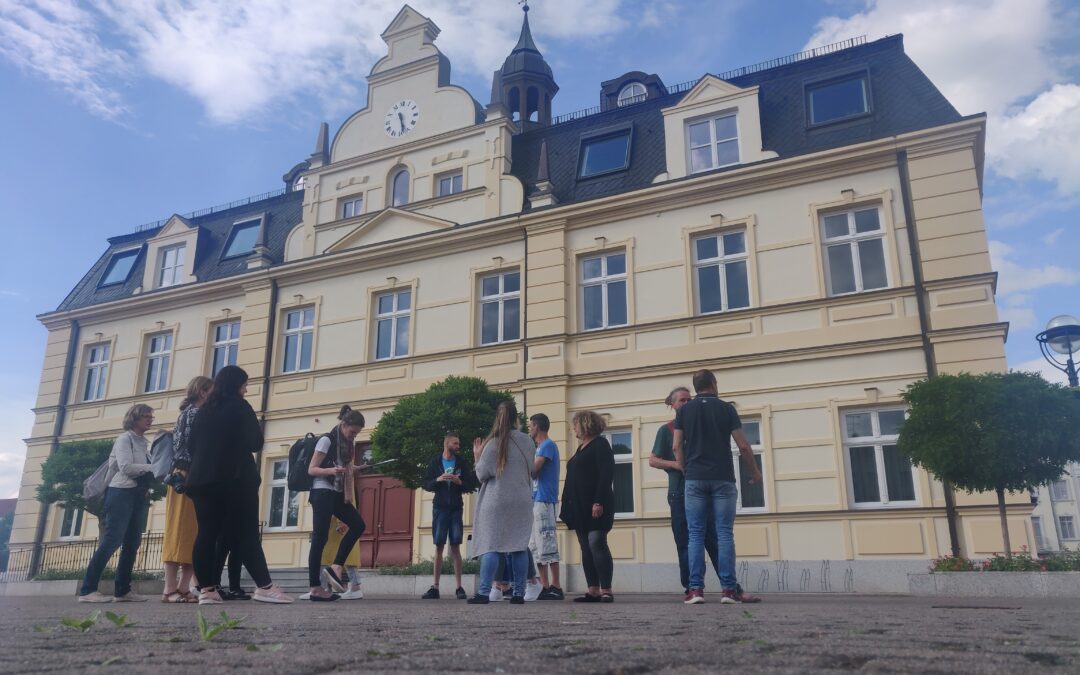
Since the end of 2020, the four small towns of Zwönitz (Saxony), Bönen (North Rhine-Westphalia), Demmin (Mecklenburg-Western Pomerania) and Münnerstadt (Bavaria) have been working together on the “Innenstadt (be)leben!” project. The alliance is one of six model projects in the pilot phase of the Small Town Academy, in which approaches for sustainable urban development are being developed. aconium supports project implementation in the four model municipalities. The German Institute of Urban Affairs is providing scientific support for the pilot project and delivering findings for the institutionalization of the Small Town Academy, which will offer a new learning and exchange platform in the coming years. The Federal Ministry of Housing, Urban Development and Building (BMWSB) and the Federal Institute for Research on Building, Urban Affairs and Spatial Development (BBSR), which are also funding the pilot phase of the “Experimental Housing and Urban Development” (ExWoSt) program, are in charge of the project. The starting point of the model project “Innenstadt (be)leben!” was “Interkollegiale Coachings”, which offered representatives of the participating small towns the opportunity to learn from the perspectives of their counterparts in other municipalities. The ideas and approaches developed here for inner city revitalization – the thematic focus of the model project – are currently being implemented in the respective small towns. The focus is on designing measures for inner city development – for example, to eliminate vacancies, create new offers or make the urban space more attractive. The project thus has an experimental character and opens up scope for the municipalities to try out unconventional approaches and formats for urban development.
Citizens design their city center
A recurring approach, which is the focus of the Small Town Academy pilot phase, is the creation of formats to involve citizens in inner city development. The municipality of Bönen, for example, has started the participatory creation of a long-term communication strategy. Under the title “Mit(te)machen”, “future walks” were held in Bönen with various target groups. The exchange will continue through regular working group meetings of the “Mit(te)macher” and an accompanying online participation. In the Hanseatic city of Demmin, the administration also relies on city walks for various groups such as retailers and associations. The broad-based discussion started in June 2022 and is now culminating in citizen dialogues. The increased use of social media and apps is also intended to improve communication between the administration and urban society in the future and thus also promote identification with the small town in Mecklenburg-Vorpommern.
Creating multifunctional meeting spaces
The perspectives of different groups on the town center were determined at a 2022 scenario workshop in the mountain town of Zwönitz in November. Many Zwönitz residents confirmed their desire for non-commercial meeting spaces in the town center. “Retail will remain very important for city centers in the future. However, there is a growing realization that retail alone cannot be the only supporting element of a sustainable city centre,” says Henrik Nürnberger, project manager at aconium GmbH. The association “Zwönitz miteinander” (Zwönitz together) was recently founded to act as a sponsor for projects to breathe life into a property in the town center. The aim is to bring back former and now sorely missed activities such as the “Musik Café” or cinema evenings. At the same time, the aim is to create a place in the heart of the small town where young people in particular can meet and spend their free time without having to spend their pocket money. New meeting spaces are also being created in Münnerstadt in Franconia: a partially vacant building directly on the market square – known as “M 17” – is to become a new meeting place for clubs. Co-working is also set to play a role in “M 17”. Münnerstadt is currently exchanging ideas with municipalities from other pilot projects that are looking more closely at “new working environments” for small towns. “Both examples show that small towns need multifunctional usage concepts for municipal facilities – on the one hand to address the diverse needs of urban society and on the other to put the maintenance of properties on a sustainable footing,” says Henrik Nürnberger. “This requires suitable concepts, especially for small municipalities, which must differ from those in large cities.” This is precisely why the future Small Town Academy is intended to pool promising approaches and experience and make them available to small towns facing similar challenges.
Gaining insights for sustainable small town development
After two and a half years, the pilot phase will come to an end at the end of March 2023. The insights gained into urban development and recommendations for action – including, for example, how future small town academy offers can be designed – will be presented in a final report. A project partner meeting on January 19, 2023, which will take place at the aconium Academy, will also discuss how the formats and measures initiated in the small towns can be made permanent. The activity report published in July 2022 provides an overview of the entire pilot phase of the Small Town Academy.

